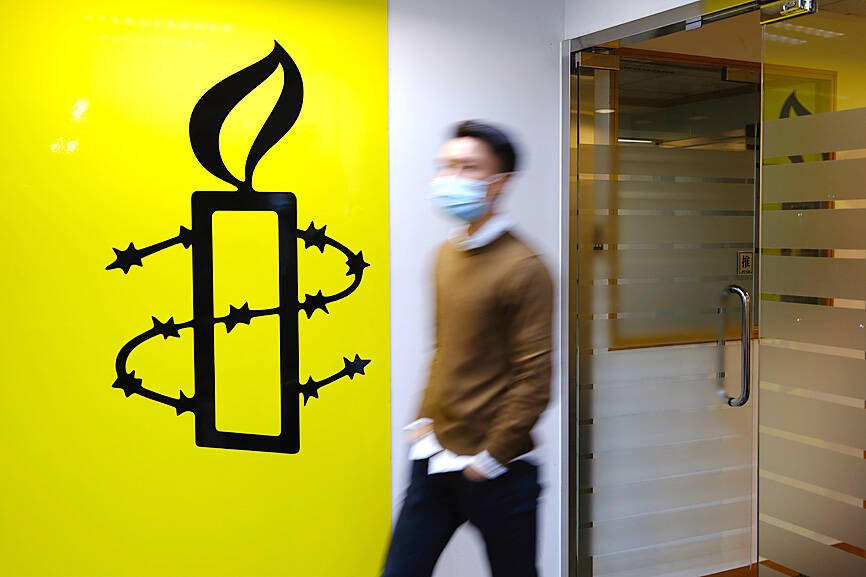Amnesty International yesterday relaunched its Hong Kong branch “in exile,” more than three years after the rights group quit the Chinese territory citing risks from a sweeping national security law.
Beijing has remolded Hong Kong in its authoritarian image after huge and sometimes violent democracy protests in 2019, imposing a security law that criminalized subversion, secession, terrorism and foreign collusion.
The international non-governmental organization closed its two offices in Hong Kong in 2021, saying at the time that Hong Kong’s National Security Law “made it effectively impossible” for rights groups to work freely.

Photo: AP
Amnesty secretary-general Agnes Callamard said that its new section “demonstrates the resilience of our movement, our determination never to be silenced and our commitment to defending human rights no matter the challenges we face.”
The branch, which is officially registered in Switzerland, said it is the first to be “founded and operated entirely ‘in exile’” and would be led by Hong Kong diaspora activists in Taiwan, Australia, Canada, the UK and the US.
Fernando Cheung (張超雄), a former Hong Kong lawmaker who joined as a board member, said top priorities include raising awareness on “prisoners of conscience” and transnational repression.
“It is clear that Hong Kong’s human rights situation has continued to worsen,” Cheung said, citing the jailing of a social worker last week over a police-protester clash in 2019.
“Being abroad, we have more latitude to speak up and connect with other international groups, as well as to conduct research and respond to events,” he added.
As of this month, Hong Kong has arrested 322 people and convicted 163 of them under two security laws — one imposed by Beijing and a homegrown one enacted last year.
Police have also issued bounties on 19 overseas democracy activists.
One of them, Joey Siu (邵嵐), said she hoped the Amnesty office can “encourage Hong Kongers living in the city or abroad in a difficult time,” adding that it was a “gesture of courage in response to repression.”

Taiwan is stepping up plans to create self-sufficient supply chains for combat drones and increase foreign orders from the US to counter China’s numerical superiority, a defense official said on Saturday. Commenting on condition of anonymity, the official said the nation’s armed forces are in agreement with US Admiral Samuel Paparo’s assessment that Taiwan’s military must be prepared to turn the nation’s waters into a “hellscape” for the Chinese People’s Liberation Army (PLA). Paparo, the commander of the US Indo-Pacific Command, reiterated the concept during a Congressional hearing in Washington on Wednesday. He first coined the term in a security conference last

A magnitude 4.3 earthquake struck eastern Taiwan's Hualien County at 8:31am today, according to the Central Weather Administration (CWA). The epicenter of the temblor was located in Hualien County, about 70.3 kilometers south southwest of Hualien County Hall, at a depth of 23.2km, according to the administration. There were no immediate reports of damage resulting from the quake. The earthquake's intensity, which gauges the actual effect of a temblor, was highest in Taitung County, where it measured 3 on Taiwan's 7-tier intensity scale. The quake also measured an intensity of 2 in Hualien and Nantou counties, the CWA said.

The Overseas Community Affairs Council (OCAC) yesterday announced a fundraising campaign to support survivors of the magnitude 7.7 earthquake that struck Myanmar on March 28, with two prayer events scheduled in Taipei and Taichung later this week. “While initial rescue operations have concluded [in Myanmar], many survivors are now facing increasingly difficult living conditions,” OCAC Minister Hsu Chia-ching (徐佳青) told a news conference in Taipei. The fundraising campaign, which runs through May 31, is focused on supporting the reconstruction of damaged overseas compatriot schools, assisting students from Myanmar in Taiwan, and providing essential items, such as drinking water, food and medical supplies,

New Party Deputy Secretary-General You Chih-pin (游智彬) this morning went to the National Immigration Agency (NIA) to “turn himself in” after being notified that he had failed to provide proof of having renounced his Chinese household registration. He was one of more than 10,000 naturalized Taiwanese citizens from China who were informed by the NIA that their Taiwanese citizenship might be revoked if they fail to provide the proof in three months, people familiar with the matter said. You said he has proof that he had renounced his Chinese household registration and demanded the NIA provide proof that he still had Chinese